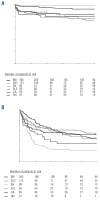Autologous hematopoietic stem cell transplantation for autoimmune diseases: an observational study on 12 years' experience from the European Group for Blood and Marrow Transplantation Working Party on Autoimmune Diseases
- PMID: 19773265
- PMCID: PMC2817032
- DOI: 10.3324/haematol.2009.013458
Autologous hematopoietic stem cell transplantation for autoimmune diseases: an observational study on 12 years' experience from the European Group for Blood and Marrow Transplantation Working Party on Autoimmune Diseases
Abstract
Background: Autologous hematopoietic stem cell transplantation has been used since 1996 for the treatment of severe autoimmune diseases refractory to approved therapies. We evaluated the long-term outcomes of these transplants and aimed to identify potential prognostic factors.
Design and methods: In this observational study we analyzed all first autologous hematopoietic stem cell transplants for autoimmune diseases reported to the European Group for Blood and Marrow Transplantation (EBMT) registry between 1996-2007. The primary end-points for analysis were overall survival, progression-free survival and transplant-related mortality at 100 days.
Results: Nine hundred patients with autoimmune diseases (64% female; median age, 35 years) who underwent a first autologous hematopoietic stem cell transplant were included. The main diseases were multiple sclerosis (n=345), systemic sclerosis (n=175), systemic lupus erythematosus (n=85), rheumatoid arthritis (n=89), juvenile arthritis (n=65), and hematologic immune cytopenia (n=37). Among all patients, the 5-year survival was 85% and the progression-free survival 43%, although the rates varied widely according to the type of autoimmune disease. By multivariate analysis, the 100-day transplant-related mortality was associated with the transplant centers' experience (P=0.003) and type of autoimmune disease (P=0.03). No significant influence of transplant technique was identified. Age less than 35 years (P=0.004), transplantation after 2000 (P=0.0015) and diagnosis (P=0.0007) were associated with progression-free survival.
Conclusions: This largest cohort studied worldwide shows that autologous hematopoietic stem cell transplantation can induce sustained remissions for more than 5 years in patients with severe autoimmune diseases refractory to conventional therapy. The type of autoimmune disease, rather than transplant technique, was the most relevant determinant of outcome. Results improved with time and were associated with the transplant centers' experience. These data support ongoing and planned phase III trials to evaluate the place of autologous hematopoietic stem cell transplantation in the treatment strategy for severe autoimmune diseases.
Figures
Comment in
-
Stem cell transplantation for autoimmune diseases.Haematologica. 2010 Feb;95(2):185-8. doi: 10.3324/haematol.2009.017038. Haematologica. 2010. PMID: 20139390 Free PMC article. No abstract available.
References
-
- Davidson A, Diamond B. Autoimmune diseases. N Engl J Med. 2001;345(5):340–50. - PubMed
-
- Sykes M, Nikolic B. Treatment of severe autoimmune disease by stem-cell transplantation. Nature. 2005;435(7042):620–7. - PubMed
-
- Marmont A, Tyndall A, Gratwohl A, Vischer T. Haemopoietic precursor-cell transplants for autoimmune diseases. Lancet. 1995;345:978. - PubMed
Publication types
MeSH terms
LinkOut - more resources
Full Text Sources
Other Literature Sources
Medical


